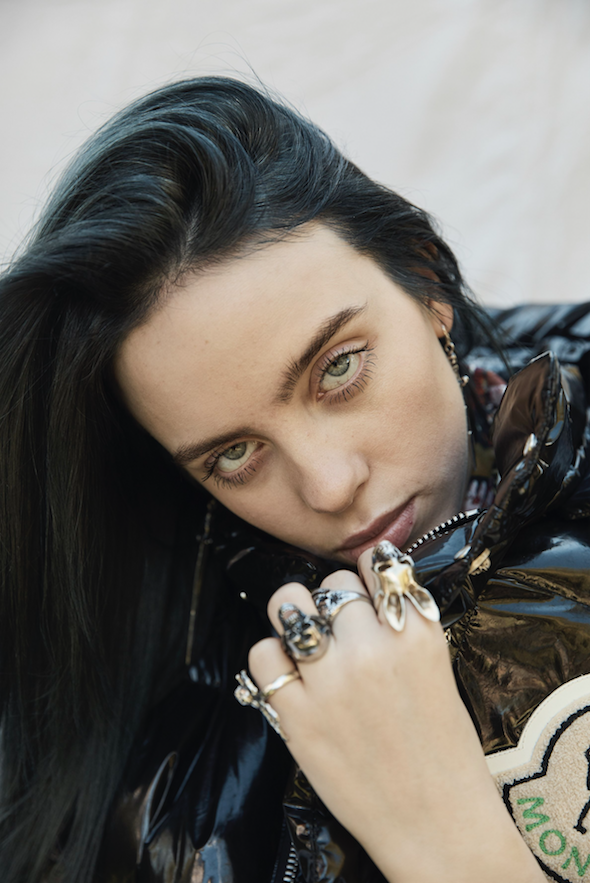"I'm the bad guy," Billie Eilish declares in "Bad Guy," the first song on her debut album, When We All Fall Asleep, Where Do We Go? (Darkroom/Interscope); then the music pauses to splice in one spoken, very teenage syllable: "Duh!" You can hear the eyeroll.
Eilish, 17, has spent the last few years establishing herself as the negation of what a female teen-pop star used to be. She doesn't play innocent, or ingratiating, or flirtatious, or perky, or cute. Instead, she's sullen, depressive, death-haunted, sly, analytical and confrontational, all without raising her voice.
On singles and EPs, such as her 2017 EP Don't Smile at Me, Eilish's songs have treated love as a power struggle, an absurd game, and a destructive obsession, racking up more than a billion streams from listeners who apparently share her sentiments. On her Instagram page, which has more than 15 million followers, she is brusquely anti-fashion, swaddling herself in shapeless, oversize, boldly colored clothes and making silly or ghoulish faces. "I do what I want when I'm wanting to/My soul so cynical," she notes in "Bad Guy." But that's just her starting point. While Eilish's previous releases have featured her flinty, defensive side, her debut album also admits to sorrows and vulnerabilities.
In some ways the album arrives as a continuation, not an introduction. Like her previous releases, it's the work of a very small, decidedly innovative family team. Eilish writes and records her songs with her older brother, Finneas O'Connell, working largely at home. The sound they have built for her is sparse with instrumentation and large with implication. A typical track uses just a handful of parts, nearly all of them electronic: a bass line, a beat, only enough keyboard notes to sketch a harmony. Eilish sings barely above a whisper, a signal of intimacy.
But at any moment, the tracks are likely to flaunt their artificiality: adding samples or sound effects, distorting her voice, suddenly deploying a big bass drop. "Wish You Were Gay" -- a guy is ignoring her, and she wishes he was indifferent to her gender rather than her in particular -- starts with just acoustic-guitar chords and her voice, tokens of pop sincerity. But the mix also includes a tittering audience and applause at the end, insisting that the song is archly theatrical. In Eilish's digital-native universe, it's impossible to pretend that anything is unobserved or unmediated; everything is self-conscious.
While albums in the streaming era aren't always made to be heard as a whole, When We All Fall Asleep, Where Do We Go? traces a clear arc: from bravado to melancholy. Early in the album are songs like "You Should See Me in a Crown" -- an ominously assured, sustained and then slamming claim to power -- and the mocking, music-hall flavored "All the Good Girls Go to Hell," as well as "Xanny," a ballad that disdains the trendy overuse of the anti-anxiety drug Xanax. But with a stretch of songs near the end of the album, Eilish turns to thoughts of grief, suicide and loneliness.
"Bury a Friend," with a pulsing, nervous undercurrent and sampled screams, veers between mourning, lashing out and self-destructive thoughts. "Ilomilo" has a briskly plinking, near-ska beat, but it worries over a suicidal friend: "I might break/If you're gonna die not by mistake." In "Listen Before I Go," a glacial piano ballad with looming reverberations, the narrator herself is suicidal; "Sorry, can't save me," she warns, and sirens at the end suggest the worst. It's followed by the whispery "I Love You," a hovering, hesitant confession: "I don't want to, but I love you."
Eilish began her career establishing what kind of pop star she doesn't intend to be. With her debut album, she's even tougher: tough enough to show some heart.
Style on 04/07/2019
